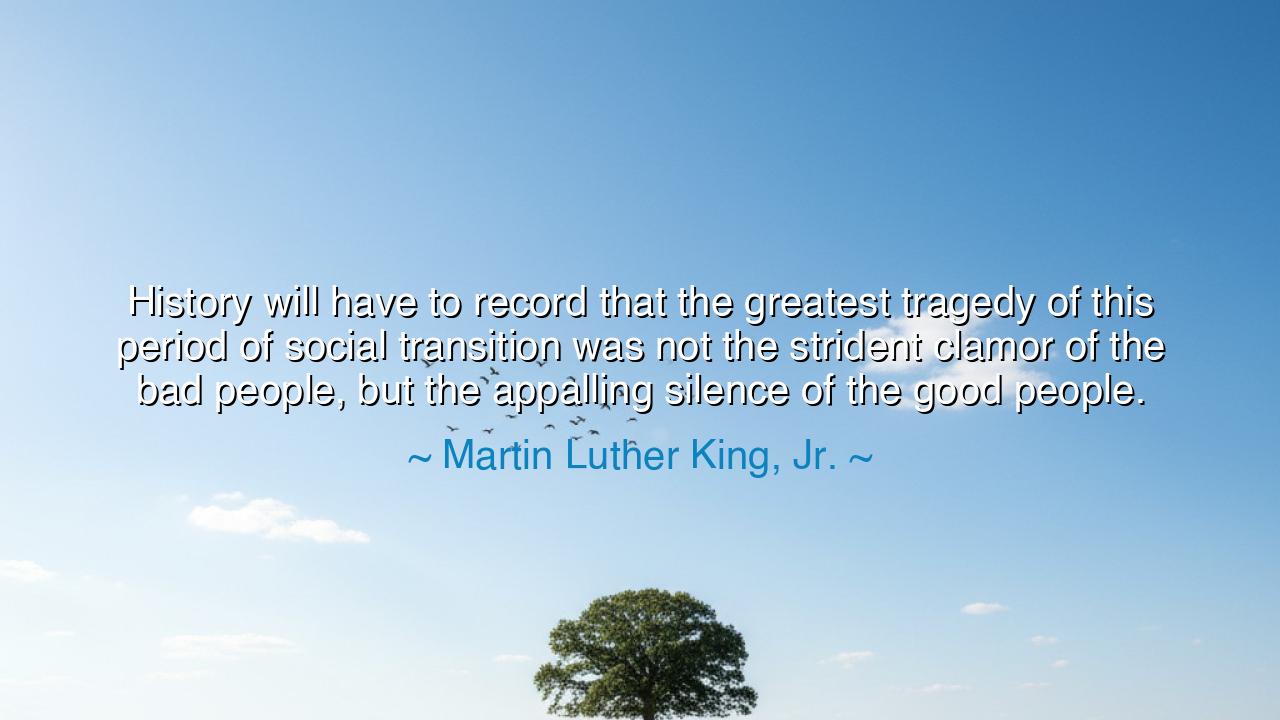
History will have to record that the greatest tragedy of this
History will have to record that the greatest tragedy of this period of social transition was not the strident clamor of the bad people, but the appalling silence of the good people.






“History will have to record that the greatest tragedy of this period of social transition was not the strident clamor of the bad people, but the appalling silence of the good people.” Thus spoke Dr. Martin Luther King, Jr., the prophet of peace and justice, whose words still burn like fire in the conscience of humanity. In this powerful truth, he revealed one of the deepest sorrows of moral struggle — that evil often triumphs not because it is strong, but because goodness grows silent. It is not always the cruelty of the wicked that destroys civilizations, but the complacency of the righteous, the indifference of those who see wrong and choose to look away.
The origin of this quote lies in King’s reflections during the height of the Civil Rights Movement in the 1960s, a time when America was torn between its promise of freedom and its practice of segregation. He wrote these words in response to the lukewarm support of many white moderates and church leaders who claimed to sympathize with his cause, yet urged patience instead of action. To King, this half-hearted neutrality was more painful than open hatred. “The appalling silence of the good people,” he said, was more dangerous than “the strident clamor of the bad,” because silence gives injustice its shelter, allowing it to grow bold and unchallenged.
Dr. King understood a truth as old as time: evil is loud, but silence makes it eternal. When the good remain quiet in the face of wrong, they become unwitting allies of oppression. He had seen this throughout history — in the silence of the church during slavery, in the apathy of citizens during the rise of fascism, in the comfort of those who benefit from others’ suffering. Just as fire needs air to burn, injustice needs silence to survive. To stand aside, to say nothing, is not neutrality — it is complicity. King called upon the conscience of humanity to awaken, to recognize that moral responsibility demands speech, even when speech is dangerous.
Consider the example of Germany in the 1930s, when Adolf Hitler rose to power. Many good and ordinary people, though disturbed by his hatred and violence, remained silent. They hoped someone else would act. They feared losing comfort, position, or safety. Their silence became the fertile soil in which tyranny grew. As the poet once said, “The world is not destroyed by those who do evil, but by those who watch them without doing anything.” In this same spirit, King saw that America’s racial injustice endured not because of the strength of its enemies, but because of the weakness of its friends — those who chose peace over justice, order over righteousness.
Yet King’s words are not only a rebuke — they are a summons to courage. He does not condemn the good for their failure; he calls them to awaken. For he believed in the power of conscience, in the flame that sleeps within every soul. The “silence of the good” is not permanent; it can be broken when hearts remember that justice is love made public. He urged his listeners to speak out — in the pulpit, in the streets, in the halls of government — for silence, he said, was betrayal, not only of the oppressed, but of one’s own soul. To speak the truth, even alone, is to break the spell of fear and to begin the healing of the world.
This principle reaches beyond King’s time. In every age, there are injustices that thrive on silence — poverty, corruption, discrimination, violence. The faces of the oppressed change, but the moral test remains the same: will the good speak? Or will they wait until it is too late? Every generation must choose between comfort and conscience. The good must not only feel sympathy; they must act. King’s own life embodied this truth. He marched though beaten, he spoke though threatened, he suffered though weary — because he knew that silence was death to the soul of a people.
So, my children, take this teaching into your hearts: speak when silence is easier, and act when apathy tempts you to rest. You are not called to be perfect, but to be present; not to solve all wrongs, but to refuse to ignore them. Remember that history will not only judge the cruelty of the wicked, but the passivity of the good. Do not let your life be a quiet witness to injustice. Let it be a voice, however small, that cries for truth.
And thus, the wisdom of Martin Luther King, Jr. endures: evil shouts, but justice whispers — until the good give it their voice. The tragedy of silence can yet become the triumph of courage. Speak, then, while you have breath, for every word of truth is a light against the darkness — and every silence broken is the beginning of freedom.






AAdministratorAdministrator
Welcome, honored guests. Please leave a comment, we will respond soon